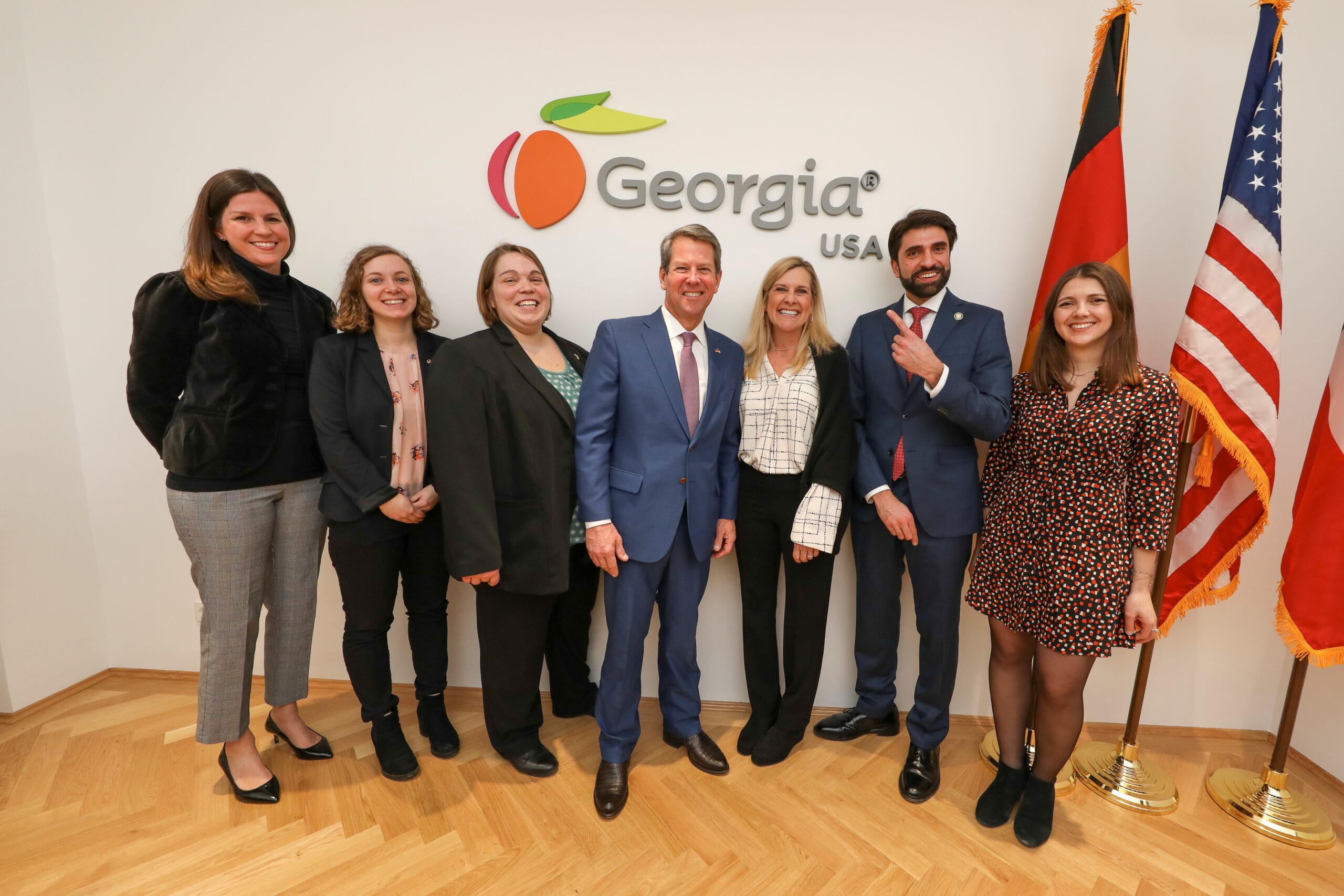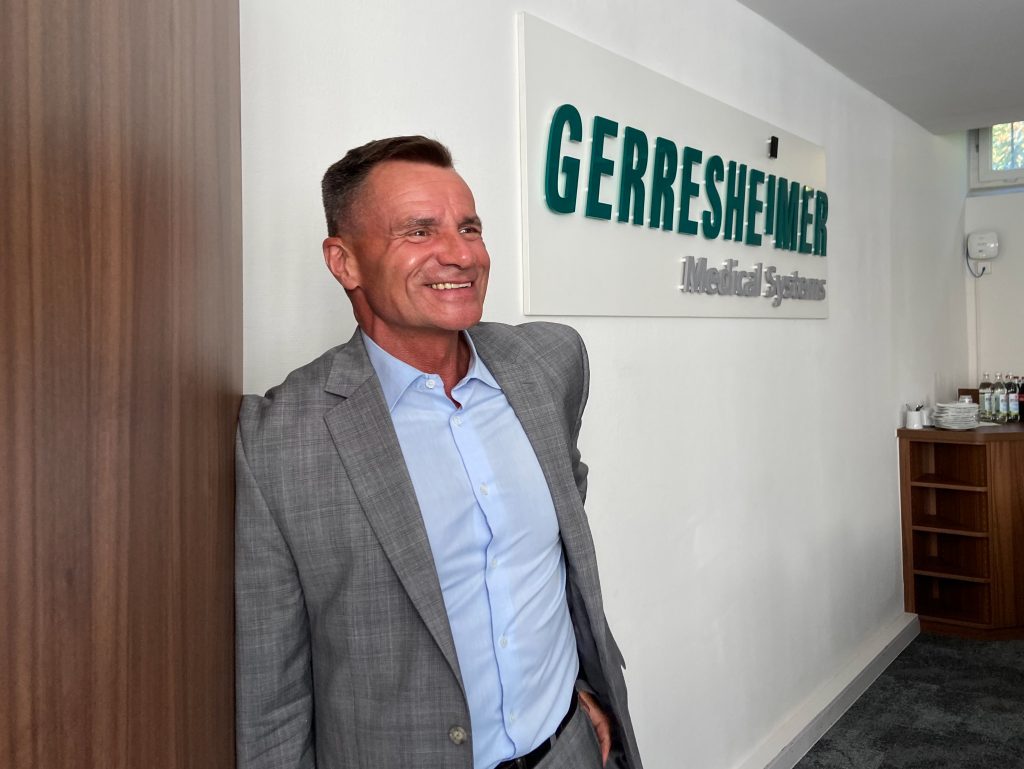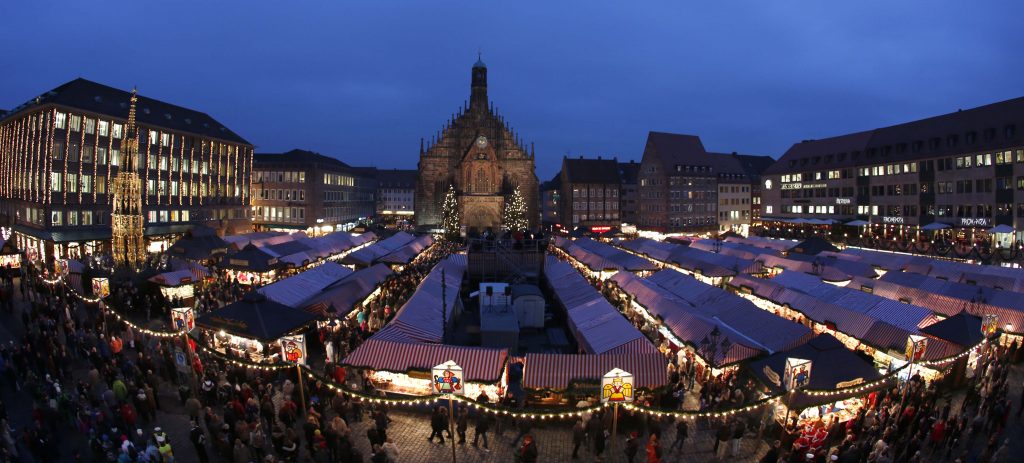Germany And Georgia: Why Is This Relationship So Tight?

Gov. Kemp’s 2020 mission to Germany with the Europe office team.
Georgia Department of Economic Development
Up a flight of stairs in a more than a century-old building in Munich, a stone’s throw from the Bavarian State Parliament, there’s a little slice of the state of Georgia: an office featuring the University of Georgia and Georgia Tech swag, Georgia-made peanut butter, even a portrait of Gov. Brian Kemp and first lady Marty Kemp.
It’s the largest of Georgia’s 12 international economic development offices, which is no accident, said Economic Development Commissioner Pat Wilson.
“Germany, over the last probably four decades, has been the major economy in Europe that has driven investment and trade out of Georgia,” he said. “That relationship only continues to strengthen and provide more opportunities.”
An estimated 500 German companies are located in the state, and Germany is also a top export market for Georgia products. Wilson visits multiple times a year, and Kemp took a trip in early 2020.
“I could get on a flight every month and go to Germany,” Wilson said. “There’s just that much business for us to be doing.’

Germany is “one of the leading sources of foreign direct investment for us anywhere in the world,” said Sérgio Domingues, managing director of Georgia’s Europe office in Munich.
There are several reasons why–many have to do with location. Atlanta’s airport and the Port of Savannah are key.
The German business model fits very well into our culture and really into rural Georgia.”
But also, Wilson said, considering that the automotive industry is the “backbone” of the German manufacturing economy, and Georgia is located in the middle of the many Southeast auto manufacturers, the state has been able to pull in many auto suppliers.
Georgia also makes sense for aerospace suppliers working with Gulfstream in Savannah or Boeing in South Carolina.
“I’d like to say that you can’t build a car anywhere in the southeast without Georgia suppliers who are contributing to that effort,” Domingues said.
“A deep and strong collaboration”
But other factors make a difference in recruiting German businesses as well, Domingues said. “A big part of it is the ease of doing business. It’s about already having a thriving and growing German business community [in Georgia]. There’s German diplomatic representation.”
Germany has had a consular presence in Atlanta since 1861. The German American Chamber of Commerce of the Southern U.S. is headquartered in Atlanta. Atlanta has a German School as well.
“There are a lot of things that bind Germany and the U.S. from a cultural standpoint, from an economic standpoint,” Domingues said.
“We’re really trying to bring those back into the fore so that companies can consider the United States as a premier location for foreign direct investment and Georgia more specifically.”
A hallmark of Germany’s economy, known as the “Mittelstand,” or family-owned small-to-medium sized companies often based in smaller towns are in turn drawn to smaller, rural Georgia towns for American locations, Wilson explained.
And these companies are the cornerstone of German investment in Georgia.
“I think they find investing in smaller towns in Georgia very similar to their business model in Germany,” he said. “The German business model fits very well into our culture into and really into rural Georgia.”
Georgia offers tax incentive packages to attract companies, but that wasn’t the deciding factor for Oliver Burgel, senior vice president at Gerresheimer AG, a medical device manufacturing company based in Regensburg, Germany.
Gerresheimer chose Peachtree City for a major expansion in 2014.

“If you compare the incentives, that is something that a lot of states do in the U.S. So what really made the difference is the ease of working together,” Burgel said.
“The collaboration, I would really call it a deep and strong collaboration, I would say kind of a friendship on a business level.”
Georgia state officials even helped Burgel’s team with a visa to the U.S. during the pandemic, he said.
There are more official layers to the relationship between Germany and Georgia: a sister state relationship with the German state of Bavaria and a sister city relationship between Atlanta and Nuremberg.
Nuremberg actually sought out sister cities more than two decades ago to change its postwar international image. (In the 1930s, The German city hosted major Nazi rallies and after World War II hosted the trials where former Nazis were prosecuted.)
And because of this past, Nuremberg struggled to find an American partner city, said Christina Plewinski with Nuremberg’s international affairs office.
“A lot of Americans said, ‘Well, we would really welcome a German sister city. But Nuremberg is really quite difficult. It might be difficult to explain to our citizens,’” she recalled.
But Atlanta was game.
“I guess they understood that we are a city with a dark past who wants to really deal with it. And I said, ‘Well, that’s quite similar with us, because of our slavery,’” she said.
“So they thought we could learn from each other in that process. And we still do.”

The sister city relationship features educational exchanges, including between high schools and colleges. Nuremberg will also facilitate conversations between companies looking to move to Georgia with those already there, she said.
And then there’s Atlanta’s annual Christmas Market or Christkindl Market, which Nuremberg helped organize. (Nuremberg is famous for having the oldest Christmas Market in Germany.)
“It’s one of our most beautiful German markets in the world,” Plewinski said of the Atlanta market, which is set to re-open after a pandemic break in Centennial Olympic Park this winter.








